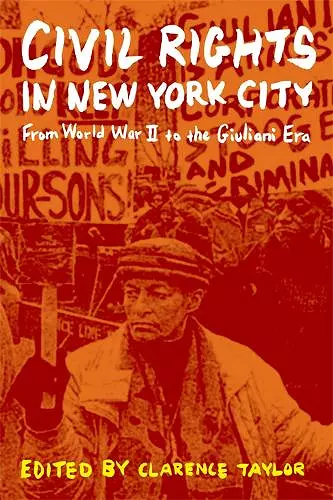Civil Rights in New York City
From World War II to the Giuliani Era
Format:Hardback
Publisher:Fordham University Press
Published:15th Apr '11
Currently unavailable, and unfortunately no date known when it will be back

Since the 1960s, most U.S. History has been written as if the civil rights movement were primarily or entirely a Southern history. This book joins a growing body of scholarship that demonstrates the importance of the Northern movement.
Since the 1960s, most U.S. History has been written as if the civil rights movement were primarily or entirely a Southern history. This book joins a growing body of scholarship that demonstrates the importance of the Northern history of the movement. The contributors make clear that civil rights in New York City were contested
in many ways, beginning long before the 1960s, and across many groups with a surprisingly wide range of political perspectives. Civil Rights in New York City provides a sample of the rich historical record of the fight for racial justice in the city that was home to the nation’s largest population of African-Americans in mid-twentiethcentury America.
The ten contributions brought together here address varying aspects of New York’s civil rights struggle, including the role of labor, community organizing campaigns, the pivotal actions of prominent national leaders, the movement for integrated housing, the fight for racial equality in public higher education, and the part played by a revolutionary group that challenged structural, societal inequality. Long before the Montgomery Bus Boycott, the Reverend Adam Clayton Powell Jr. helped launch the Harlem Bus Boycott of 1941. The New York City’s Teachers’ Union had been fighting for racial equality since 1935. Ella Baker worked with the NAACP and the city’s grassroots movement to force the city to integrate its public school system. In 1962, a direct
action campaign by Brooklyn CORE, a racially integrated membership organization, forced the city to provide better sanitation services to Bedford-Stuyvesant, Brooklyn’s largest black community. Integrating Rochdale Village in South Jamaica, the largest middle-class housing cooperative in New York, brought together an unusual coalition of leftists, liberal Democrats, moderate Republicans, pragmatic government officials,
and business executives.
In reexamining these and other key events, Civil Rights in New York City reaffirms their importance to the larger national fight for equality for Americans across racial lines.
"Clarence Taylor long has been recognized as the most important historian of this nation's most important city: New York. Now he has assembled a veritable "Dream Team" of scholars who contribute their own unique expertise in shedding light on how and why Gotham engaged the critically profound question of Civil Rights in the way it did. This book, as a consequence, is a monumental contribution to the history of Civil Rights, African-American History, Urban History, Latino History and--most of all--the history of New York City." -- -Gerald Horne author, of 'Mau Mau in Harlem? The U.S. and the Liberation of Kenya' "Several monographs on [this subject] have been written, but none rival this one in terms of breadth or depth." -- -Peter B. Levy York College "Attempts to provide some balance through 10 academic essays that cast light on struggles between blacks and organized labor, civil rights and the cold war, discrimination that extended even to garbage collection, and the competing visions of Mayors David N. Dinkins and Rudolph W. Giuliani." -The New York Times "I've been waiting for such a book for years. Anyone interested in postwar New York or the modern civil rights movement needs to read this book. The history of the black freedom struggle looks much different when we widen our gaze from the Cradle of the Confederacy to the home of Ellis Island." -- -Jeanne Theoharis Brooklyn College of CUNY "The book, edited by Professor Taylor, revives the forgotten roles of figures like Ella Baker of the N.A.A.C.P., Robert Moses and Bayard Rustin..." -The New York Times
ISBN: 9780823232895
Dimensions: unknown
Weight: unknown
176 pages